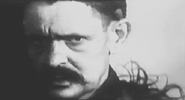On a raining afternoon in a remote Hungarian countryside at some indeterminate time after the collapse of the 1848 revolution against Austrian rule, an unassuming man is led away from the oddly surreal congregation of weary prisoners who have been assembled at the courtyard of a detention camp on nebulous grounds of suspicious activity. The camera then fluidly tracks the movements of the characters as the prisoner is escorted by an enigmatic, cloaked official into a room of a nearby abandoned farmhouse, encounters another official on the premises who, in turn, walks towards the rear of the farmhouse for his appointment: an aging peasant woman (Ida Siménfalvy) summoned to identify the remains of her husband and son. The first official methodically and dispassionately reveals that the man has been arrested for smuggling propaganda from an exiled patriot and revolutionary leader, Louis Kossuth, into Hungary, but curiously, sets him free. In an understatedly elegant long shot, the man is observed walking away before a shot breaks the silence of the idyllic pastoral landscape, and the man falls to the ground. Meanwhile, returning to the prison camp, the old woman identifies the cowardly Janos Gajdar (János Görb) as one of the roving outlaws, and is immediately brought before the interrogators. With little hope of escaping the gallows, Janos attempts to bargain for his life by acting as an informant for the Austrian gendarmes and in the process, initiates a cycle of betrayal, violence, and deceit in an attempt to ferret out the revolutionaries from the randomly assembled prisoners.
Miklós Jancsó creates a sublime, provocative, and haunting examination of moral bankruptcy and human cruelty in The Round-Up. A profound influence on the spiritually bleak and alienated cinema of Hungarian compatriot Béla Tarr, Jancsó’s signature detached long shots and spare, omniscient crane shots reinforce the insidious, distrustful, and uncertain landscape of Hungary after the failed revolution: the opening shot of the prisoner roundup against the image of the setting sun on the barren plains; the overhead shot of the captured insurgent’s assassination that tracks to a shot of the crowded prison yard; the circular procession of shackled, hooded prisoners as they return to their holding cells; the chaotic lashing of a woman that proves to be a catalyst for disillusioned prisoners committing suicide. Through languid and sweeping pans, minimal composition, and oppressive environment that reflect the emotional vacuity, hopelessness, and isolation of the detained prisoners, The Round-Up presents an understated, yet harrowing portrait of spiritual desolation, betrayal, and existential limbo.
© Acquarello 2002. All rights reserved.
